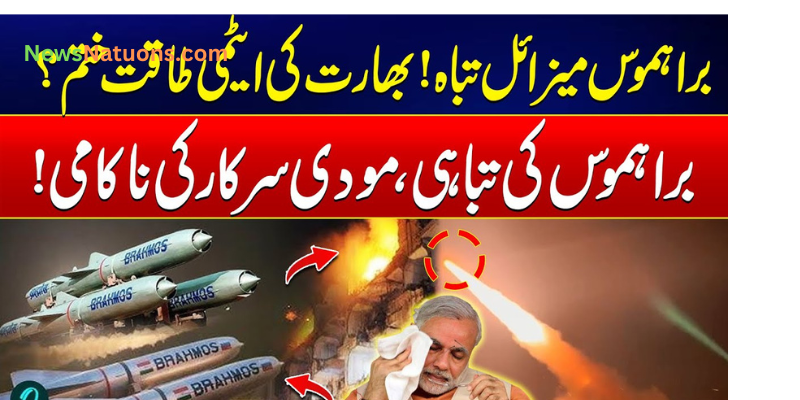In March 2022, an alarming incident occurred when an unarmed Indian BrahMos missile was accidentally fired into Pakistani territory. This event not only raised international concerns but also exposed significant flaws in India’s military oversight. The missile, capable of carrying a nuclear warhead, landed in the Mian Channu area of Punjab, Pakistan. Miraculously, it caused no casualties, but the implications of this incident were deeply disturbing.
Pakistan responded with strong diplomatic protest, calling it a serious violation of its airspace and a threat to regional peace. Indian officials claimed it was an accident caused by a “technical malfunction” during routine maintenance. However, this explanation did little to calm the outrage. The world watched closely as the mishandling of such a dangerous weapon highlighted severe negligence within the Indian defense system.
The BrahMos Missile: A Powerful Weapon of War
The BrahMos missile is a supersonic cruise missile developed jointly by India and Russia. It can travel at speeds nearly three times the speed of sound and has a range of up to 500 kilometers. It is one of the most advanced weapons in India’s arsenal and is designed for precision strikes.
When such a weapon is misfired, even accidentally, it reflects poorly on the systems and protocols meant to control it. The international community, including defense analysts and security experts, questioned how such a powerful missile could be launched without proper authorization or control. The answer pointed to glaring issues in India’s internal military checks.
Pakistan’s Response: Calm but Firm
Following the missile crash, Pakistan acted with a level head, avoiding an immediate military retaliation. Instead, the government summoned Indian diplomats and demanded a full explanation. The Pakistan Air Force had tracked the missile’s flight path and could have responded aggressively, but restraint was shown to prevent escalation.
Pakistan’s DG ISPR, in a press briefing, stated that the incident could have resulted in a major disaster and war between two nuclear nations. He emphasized that Pakistan expects international bodies to take notice and urged India to provide a transparent investigation. Many Pakistani officials and citizens criticized the Indian explanation, calling it a dangerous display of carelessness.
Modi Government Under Fire
The Modi government came under heavy scrutiny following the incident. Opposition leaders within India raised serious questions about military discipline and national security. They argued that if such a catastrophic error could happen with a missile, what guarantees are there that the same won’t happen with a nuclear warhead?
International observers also began to worry. A number of think tanks and defense organizations expressed concern that a similar incident in the future could lead to unintended war. The lack of immediate communication from India to Pakistan after the incident was especially criticized. It took more than 24 hours for Indian officials to acknowledge the mistake, raising suspicions about transparency.
Ceasefire Agreement Now Under Pressure
The 2003 ceasefire agreement between India and Pakistan was already fragile. Incidents like the BrahMos misfire only add further tension to an already volatile border situation. Pakistan called the missile firing a violation of the spirit of the ceasefire and accused India of irresponsible behavior.
Trust, once broken in such matters, is difficult to rebuild. The ceasefire agreement was a symbol of cautious cooperation, but this event exposed how quickly things can spiral out of control. If Pakistan had misinterpreted the missile as an attack, the result could have been catastrophic.
International Reaction and Call for Accountability
Several international voices called on India to ensure such incidents never happen again. Countries like China and Russia, although strategic allies, remained neutral but quietly concerned. The United Nations refrained from direct criticism but emphasized the need for robust control of strategic weapons.
Meanwhile, global peace organizations demanded a joint inquiry and increased communication between the two countries to prevent any future mishaps. The incident has been recorded as one of the most dangerous peacetime military accidents in the region.
Lessons for the Future
The BrahMos missile accident is more than just a technical error; it is a wake-up call for both nations. India must review its internal controls, command structures, and launch protocols to prevent such incidents. Meanwhile, Pakistan’s calm response showed a responsible approach, but future patience cannot be guaranteed if such mistakes continue.
The two nuclear neighbors must establish clear lines of emergency communication and conduct joint safety checks under international supervision if needed. Without such measures, one more “mistake” could lead to irreversible consequences.
مارچ 2022 میں ایک حیران کن واقعہ پیش آیا جب بھارت نے براہموس میزائل غلطی سے پاکستانی حدود میں داغ دیا۔ یہ واقعہ نہ صرف عالمی سطح پر تشویش کا باعث بنا بلکہ بھارت کی عسکری نگرانی کے نظام میں سنگین خامیوں کو بھی بے نقاب کر گیا۔ یہ میزائل جو کہ ایٹمی صلاحیت کا حامل بھی ہو سکتا تھا، پنجاب کے علاقے میاں چنوں میں گرا۔ خوش قسمتی سے اس سے کوئی جانی نقصان نہیں ہوا، لیکن اس کے اثرات خطرناک تھے۔
پاکستان نے اس پر سخت سفارتی احتجاج کیا اور اسے فضائی حدود کی سنگین خلاف ورزی قرار دیا۔ بھارت نے اسے ایک “تکنیکی خرابی” کا نتیجہ قرار دیا جو معمول کی دیکھ بھال کے دوران پیش آئی۔ تاہم یہ وضاحت پاکستان اور بین الاقوامی برادری کو مطمئن کرنے میں ناکام رہی۔
براہموس میزائل: ایک خطرناک جنگی ہتھیار
براہموس میزائل بھارت اور روس کے مشترکہ تعاون سے تیار کردہ ایک سپرسونک کروز میزائل ہے۔ یہ آواز کی رفتار سے تقریباً تین گنا زیادہ تیزی سے سفر کرتا ہے اور اس کی رینج 500 کلومیٹر تک ہے۔ یہ بھارت کے جدید ترین ہتھیاروں میں شمار ہوتا ہے۔
ایسے ہتھیار کا غلطی سے داغا جانا عسکری نظام کی ناکامی کی واضح علامت ہے۔ عالمی دفاعی تجزیہ کاروں نے اس بات پر شدید تحفظات کا اظہار کیا کہ ایک اتنا خطرناک میزائل بغیر کسی اجازت یا کنٹرول کے کیسے لانچ ہو سکتا ہے۔ جواب صرف ایک تھا: بھارتی نظام میں سنگین خامیاں۔
پاکستان کا تحمل مزاج مگر مضبوط ردعمل
میزائل گرنے کے بعد پاکستان نے فوری طور پر عسکری ردعمل دینے کے بجائے سفارتی طریقہ اختیار کیا۔ بھارتی سفیروں کو طلب کر کے وضاحت طلب کی گئی۔ پاک فضائیہ نے میزائل کی پرواز کو مانیٹر کیا لیکن صورت حال کو بگاڑنے سے گریز کیا۔
ڈی جی آئی ایس پی آر نے پریس بریفنگ میں کہا کہ یہ واقعہ دو ایٹمی ممالک کے درمیان جنگ کا پیش خیمہ بن سکتا تھا۔ انہوں نے عالمی اداروں سے مطالبہ کیا کہ اس واقعے کا نوٹس لیں اور بھارت سے مکمل اور شفاف تحقیقات کروائیں۔
مودی حکومت شدید تنقید کی زد میں
اس واقعے کے بعد مودی حکومت کو شدید تنقید کا سامنا کرنا پڑا۔ بھارت میں حزب اختلاف نے حکومت سے سوال کیا کہ جب ایک میزائل غلطی سے داغا جا سکتا ہے تو کیا ایٹمی ہتھیار بھی اسی طرح کسی دن غلطی سے استعمال ہو سکتے ہیں؟
عالمی مبصرین نے بھی تشویش کا اظہار کیا۔ بہت سے دفاعی اداروں نے خبردار کیا کہ اگر آئندہ ایسا واقعہ ہوا تو دونوں ممالک کے درمیان جنگ چھڑ سکتی ہے۔ خاص طور پر اس بات پر شدید تنقید ہوئی کہ بھارت نے واقعے کے بعد 24 گھنٹوں تک خاموشی اختیار کیے رکھی۔
سیز فائر معاہدہ دباؤ کا شکار
2003 کا سیز فائر معاہدہ پہلے ہی کمزور تھا، لیکن براہموس میزائل کے واقعے نے اس پر مزید دباؤ ڈال دیا۔ پاکستان نے اس واقعے کو سیز فائر کی روح کے خلاف قرار دیا اور بھارت کو غیر ذمہ دارانہ قرار دیا۔
ایسے معاملات میں اعتماد ایک بار ٹوٹ جائے تو بحال کرنا مشکل ہوتا ہے۔ اگر پاکستان نے اس میزائل کو حملہ سمجھ کر فوری جواب دیا ہوتا تو دونوں ممالک جنگ کے دہانے پر آ سکتے تھے۔
عالمی ردعمل اور احتساب کا مطالبہ
عالمی برادری نے بھارت سے مطالبہ کیا کہ وہ آئندہ ایسے واقعات سے بچنے کے لیے اقدامات کرے۔ چین اور روس جیسے اتحادی ممالک نے بھی تشویش کا اظہار کیا، اگرچہ ان کا ردعمل محتاط رہا۔ اقوام متحدہ نے براہ راست تنقید سے گریز کیا لیکن اسلحے پر کنٹرول کو یقینی بنانے پر زور دیا۔
عالمی امن تنظیموں نے مطالبہ کیا کہ دونوں ممالک کے درمیان ہنگامی رابطے کے ذرائع بہتر بنائے جائیں اور مشترکہ تحقیقات کروائی جائیں تاکہ آئندہ کوئی حادثہ نہ ہو۔
مستقبل کے لیے اہم سبق
براہموس میزائل کا واقعہ محض تکنیکی خرابی نہیں بلکہ ایک وارننگ ہے۔ بھارت کو اپنے عسکری نظام، لانچ کنٹرول اور اجازت ناموں پر نظر ثانی کرنی چاہیے۔ پاکستان نے بردباری کا مظاہرہ کیا، لیکن آئندہ ایسے واقعے میں شاید ردعمل مختلف ہو۔
دونوں ایٹمی طاقتوں کو چاہیے کہ ہنگامی رابطے کے ذرائع قائم کریں اور اگر ضرورت ہو تو عالمی نگرانی میں حفاظتی اقدامات پر اتفاق کریں۔ بصورت دیگر، ایک اور “غلطی” خطے کو تباہی کی طرف لے جا سکتی ہے۔











